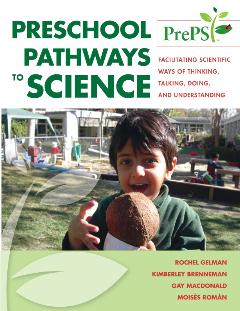
Is Preschool Too Early for Science? No!
August 6, 2010
For Curious Young Minds Eager to Understand Their World, This Age is Just Right

Related Reading
Preschool Pathways to Science (PrePS)
Facilitating Scientific Ways of Thinking, Talking, Doing, and Understanding
Rochel Gelman
Kimberly Brenneman
Gay Macdonald
Moisés Román
Paul H. Brooks Publishing Co., Inc.
Baltimore, MD
144 pages, ISBN 978-1-59857-044-1
$29.95
Until recently, science has been the ignored academic stepchild of language and math. Mandated state testing as part of No Child Left Behind initially focused on language, expanded to math, and now includes science. Concern over U.S. students’ poor science scores has brought science teaching to the forefront and a 2007 National Research Council (NRC) report, Taking Science to School, calls for broad sweeping changes in how science should be taught and organized. States are now revising science standards to be less fragmented, fewer in number, and organized around “big ideas.”
As was the case with its academic siblings, where the preschool years became a focus for providing critical foundations for language, emergent literacy and math, educators are now asking whether science should be introduced in preschool. Science is not “new” to preschool since many states include science as part of their “cognition and general knowledge” school readiness domain and Head Start includes “nature and science” as one of eight designated readiness domains. However, a recent analysis of Head Start school readiness data in one state (Greenfield et al., 2009) finds that on average, children leave the Head Start program for kindergarten with science readiness scores significantly lower than scores on the other seven school readiness domains. Follow-up focus groups with Head Start teachers pinpoint lack of time and not feeling prepared or comfortable teaching science as two possible reasons why this mandated readiness domain receives short shrift. Is preschool, however, too early for introducing science? A “strict” interpretation of Piaget would suggest so. More recent research on children’s thinking, however, clearly show that despite much of young children’s thinking being tied to the perceptual here and now, young children can think and talk about many science-related topics. The 2007 NRC report reviews this research and argues for the importance and timeliness of introducing science to young children. This urgency has important relevance beyond its direct impact on science readiness, since part of learning science involves important domain general skills that are relevant in other areas of learning.
Preschool Pathways to Science (PrePS) is a new publication that arrives on this scene, not as a rushed attempt to fill this gap, but rather as a mature program whose initial development began 20 years ago in preschool programs serving families at an Air Force base near Los Angeles. The development of PrePS has also benefited from its use at UCLA and in New Jersey, including programs serving ethnically diverse and economically disadvantaged preschool populations. A central premise of PrePS is that young children are “scientists-in-waiting … naturally curious and actively involved in exploring the world around them” (p.2). A goal of PrePS is to foster these predispositions in the “privileged domain” of science where children have a natural proclivity to learn, experiment and explore. Teachers also play a critical role in PrePS guiding children in organized investigations of their everyday world, building on existing knowledge, and connecting this knowledge into deeper levels of understanding. As one PrePS teacher reflects, “It is not about what, as a teacher, do I want the children to be doing, but what I want the children to be thinking about … Then (I ask myself), what should they be doing to better understand the concept?” (p.18).
PrePS acknowledges that preschool teachers often feel uncomfortable and ill prepared for teaching science, and provides a beginning structure for building the key science practices reviewed in Chapter 3. Detailed examples of how to introduce observation, prediction, science tools, recording, books, simple experimentation, math, and science vocabulary are included. Teacher aids such as webs of experience, weekly activities planning sheets, and science practice planning grids are also provided. Although each example is by necessity tied to a specific science content, PrePS is not about teaching specific science content knowledge, but rather “central concepts” through “related learning experiences” using areas of “inquiry focus” (p.18).
In summary, PrePS provides foundational support for introducing science in flexible, child-centered ways, as a free-standing program, or as a supplement to an existing curricular approach. PrePS has also been built upon a solid body of research in learning and cognitive development, including important contributions by the PrePS authors. Other readiness domains, including early literacy and language skills, social development, and early math, are easily incorporated into a science program and PrePS provides guidance on how to do this. Critical problem solving-skills are also emphasized. Children learn that questions have more than one answer. “PrePS strengthens basic decision making and problem-solving skills, thus, allowing children to seek and interpret information for themselves, rather than simply accept what authorities have to offer” (p.7). If you are an early childhood administrator or educator curious about the emerging excitement around preschool science or a preschool teacher looking to expand science in your classroom, PrePS is an easy read and a great place to start!
Reviewed by Daryl B. Greenfield, Ph.D.
Professor of Psychology & Pediatrics, University of Miami
For more about teaching science (and math) in preschool, check out NIEER’s policy brief, Math and Science in Preschool: Policies and Practice, by NIEER researchers Kimberly Brenneman and Judi Stevenson-Boyd and Co-Director Ellen C. Frede.
About NIEER
The National Institute for Early Education Research (NIEER) at the Graduate School of Education, Rutgers University, New Brunswick, NJ, conducts and disseminates independent research and analysis to inform early childhood education policy.
